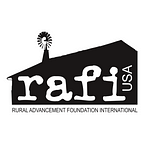Proposed USDA Rule Would Increase Transparency in Poultry Industry
Reforms Would Require Poultry Companies to Disclose New Information on Earning Potential, Input Quality, and Tournament Groups and Formulas
Secretary of Agriculture Tom Vilsack recently announced the publication of a long-awaited proposed rule regarding “Transparency in Poultry Growing Contracts and Tournaments.” The Rural Advancement Foundation International — USA (RAFI-USA) is pleased with this development and applauds Secretary Vilsack for taking this important step.
Contract poultry growers do not own the chickens they raise, nor do they choose the feed or medicine they use to raise them — these are all provided by the poultry corporation, or “integrator,” that they contract with. When these growers return flocks of fully grown chickens to their integrator for processing, the corporation does a detailed analysis of the feed conversion performance of each grower in that week’s “tournament group.” It then averages these statistics, docks the pay of the growers whose flocks were found to be below average, and transfers that money to growers of above-average flocks as bonuses. Poultry corporations cast this system as encouraging healthy competition, but in reality, the outcome of this competition is never in the control of growers.
The most decisive variables that lead to a flock performing above or below average, like the health and quality of chicks, feed, and medicine or the timing of when flocks are picked up for processing, are all controlled by the integrator. Furthermore, the fact that these factors are inherently variable results in fluctuating extra costs within the overall enterprise of growing poultry. Herein lies the perverse brilliance of the tournament system: instead of sharing these inherent costs equitably, integrators pit their growers against each other and extract these costs from whoever happens to fall below the arbitrary tournament average. Thus, instead of a legitimate competition, the tournament system functions as a way for poultry companies to transfer the risk and cost of any problems with the chicks, feed, or medicine they provide onto the growers they contract with.
“The tournament system is a deceptive, yet brilliant mechanism used by poultry companies to shift economic risks from themselves onto growers, all the while telling the growers the exact opposite,” said Steve Etka, Policy Director for the Campaign for Contract Agriculture (of which RAFI-USA is a member). “It’s no coincidence that in the most vertically integrated sector of agriculture, the poultry companies contract out one specific step of the process, and that’s actually raising the chickens. Farmers put up all of the capital costs to produce the chickens, with no control over the process, and a very low rate of return on their investments.”
The proposed “Transparency in Poultry Growing Contracts and Tournaments” rule will make some needed improvements to the poultry payment system, by:
- Requiring poultry companies to disclose the number of flocks and minimum flock stocking density that they will contractually guarantee annually, as well as any “sale of farm” policies.
- Requiring poultry companies, when finalizing a new contract, to disclose to prospective growers the income range, broken down by quintiles, of current growers in a prospective grower’s region.
- Requiring poultry companies to disclose information about the quality of the inputs they provided, and any relevant feed discrepancies, to growers, both when inputs are delivered and on settlement sheets and when growers receive their pay.
- Requiring poultry companies to provide each grower anonymized information about the quality of the inputs provided to every other grower in their “tournament group” on settlement sheets.
- Requiring poultry companies to disclose how their tournament system formulas account for input quality variability.
- Requiring poultry company CEOs to sign agreements that require the implementation of internal controls frameworks necessary to provide accurate disclosures and compliance with USDA audits of disclosed data.
“We’ve long advocated for the USDA to rule that any tournament system or formula payment arrangement that bases grower compensation on factors outside their control to be an unfair practice,” says Aaron Johnson, RAFI-USA’s Challenging Corporate Power program manager. “While this rule stops short of that standard, if finalized, it takes many important steps toward giving contract poultry growers the information they need to better advocate for themselves, while significantly increasing transparency in the industry.”
USDA is seeking public comments on the proposed rule through August 8, 2022. Additionally, USDA is “opening an inquiry into whether some practices of processors in the tournament system are so unfair that they should be banned or otherwise regulated,” through an additional advanced notice of public rulemaking comment period. RAFI-USA will continue to advocate for additional rules to ban or regulate unfair practices both within poultry tournament systems, as well as in the livestock industry generally.
Aaron Johnson is the Program Manager for the Challenging Corporate Power Program at RAFI-USA, working to end trends of concentration and extraction in the meat industry and build resilient community-rooted animal agriculture economies. Prior to joining RAFI-USA, he worked as a program designer and evaluator for several youth asset-building nonprofits in Durham, NC. Originally from Illinois, Aaron grew up spending his summers on his grandfather’s hog and dairy farm, and later working as a farmhand on his uncle’s hog farm. These formative experiences shaped Aaron’s passion for fighting for more ecologically just food systems.
